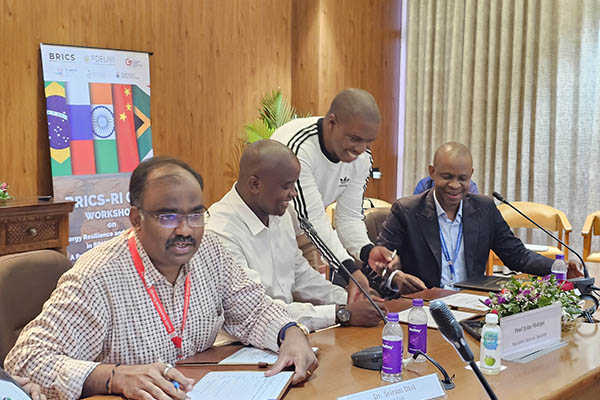Prof Kedibone Phago, director of the School of Government Studies at the North-West University (NWU), recently had the opportunity to attend a landmark workshop with the BRICS Research Community of Practice.
Hosted by the Pandit Deendayal Energy University in Gujarat, India, the event drew scholars from BRICS and BRICS+ nations, including South Africa, India, Russia, Ethiopia and Saudi Arabia.
The workshop, themed “Energy resilience and sustainability in BRICS+ nations – a policy analysis perspective”, provided a rich tapestry of discussions and presentations.
“Experts from a wide array of disciplines converged to share their insights and research on the pressing need for future energy policies that can effectively shape public policy within the BRICS+ nations,” says Prof Phago, a proud member of the BRICS Research Community of Practice based at the Durban University of Technology.
He adds that the event showcased cutting-edge knowledge through presentations and discussions on regional and country-specific issues. “Scholars highlighted the need for informed decision-making and collaboration among BRICS+ nations to promote resilient and sustainable energy solutions.”
Prof Phago says it is imperative to foster these communities of practice and to establish research chairs for the BRICS nations.
“The rationale is clear: policy development on energy resilience and sustainability must be grounded in evidence rather than merely countering the prevailing neo-liberal global order. This current order often fails to benefit developing countries, focusing instead on the extraction of raw materials without meaningful beneficiation for local communities, and perpetuating a reliance on fossil fuels from developing nations to sustain the energy needs of the developed world,” he says.
“The workshop highlighted the stark reality that the future of energy resilience and sustainability within the BRICS+ framework hinges on the development of proper global policy and governance models. These models must be designed to benefit developing countries significantly, ensuring that they are not left behind in the global energy transition.
“The consensus was clear: only through cooperative efforts and shared knowledge can the BRICS+ nations hope to achieve a resilient and sustainable energy future,” adds.

Dr Sriram Divi (Associate Professor and Head of Department of Public Policy at the Pandit Deendayal Energy University, India), Prof John Molepo (Executive Director of the South African Association of Public Administration and Management and Associate Professor in the School of Government Studies, North-West University (NWU) Dr Zamokuhle Mbandlwa (standing - Durban University of Technology) and Prof Kedibone Phago, director School of Government Studies at the North-West University (NWU)
